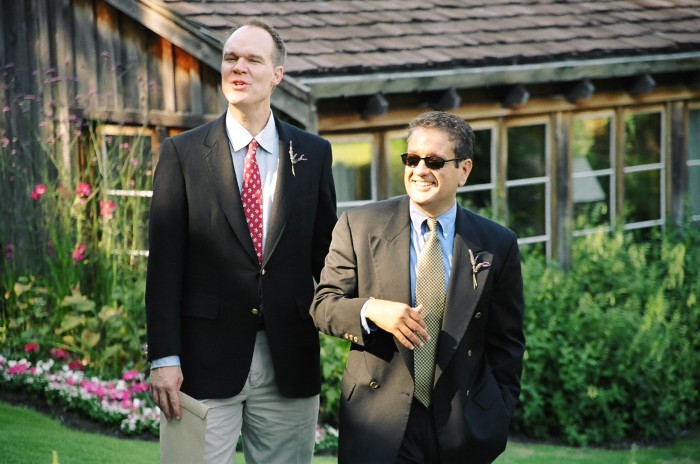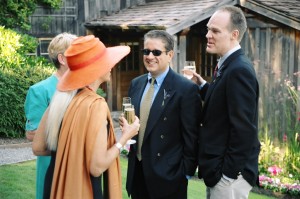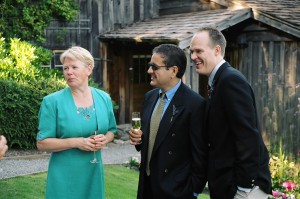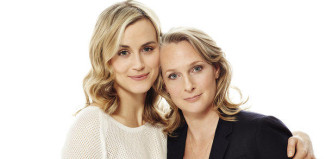At this year’s 20th Anniversary Human Rights Campaign Austin Gala Dinner, power couple Eugene Sepulveda and Steven Tomlinson will be honored with the Bettie Naylor Visibility Award for their work not only within the community, but more importantly, beyond. The last time we sat down with the couple was in 2011 as they were profiled on the cover of our November/December 2011 print magazine discussing their “Deep Connection.” Below, we connect with the couple to catch up on their advocacy, activity and awards.
LY: The Human Rights Campaign will be honoring you with the Bettie Naylor Visibility Award at the upcoming Austin Gala. What does the award mean to you as a couple?
Eugene: Wow, it’s huge. We’ve each received lots of individual recognition, but this one means more. This one is about the work we do and the communities we support as a couple. We fell in love over conversations about community and family.
LY: You worked and volunteered alongside Bettie Naylor. Do you have any favorite stories you would like to share?
Eugene: Ha! My favorite story is from 1999. It was actually from the HRC dinner one of those years. I received what we then called the Bill Ramsey Lifetime Achievement Award. My parents drove up for the dinner. At some point, I saw Bettie following my mother around. She didn’t know the woman she was cruising was my mother. When I pointed this out, her only response was telling me to go distract my father.
Okay, and some of our serious work. . . Bettie helped Lew Aldridge and I organize “radicals” in the early days of AIDS when we were advocating for more money from the City. At that time, the mayor once called me a radical because I wanted them to double the amount of money the city was providing for AIDS services. We decided to show the council what real radicals looked like. Bettie, Lew and I recruited drag queens, dikes on bikes, muscle daddies and Act Up members to protest at a couple of city hall meetings. After two meetings, the mayor decided I was the moderate one (I was chairing the city/county commission on HIV & AIDS at the time) and negotiated significantly increased funding.
Steven: my first encounter with Bettie was her calling me and insisting we meet after she realized Eugene & I were serious. She sat me down and explained the responsibilities I was about to take on – responsibilities for community leadership and stewardship. She wanted to make sure I didn’t distract Eugene but joined him.
LY: When did you first get involved with HRC and why?
Eugene: I started attending the San Antonio HRC dinner in 1988, then the Dallas dinner and was recruited to the HRC board in 1994. A bunch of friends and I organized our first Austin HRC event called Avant Garage in 1993, then the first dinner in 1995. Why? Because in Texas, we couldn’t imagine impacting our equality via the state so decided to play nationally.
Steven: I got involved because Bettie Naylor told me to.
LY: When we first sat down in 2011, we chatted more about the threat of being fired for being gay than about the opportunity to marry your partner. Did you think that fight for marriage equality would come to Texas so quickly?
Eugene: Funny, in 1995 or 96, at HRC we commissioned a poll to analyze American’s sentiments on same sex marriage and adoptions. I remember we were so deflated with the marriage results. I remember us even saying it’d take at least 25 years. And, during the time of AIDS, that certainly seemed like our life times. It wasn’t until we hired a woman, Elizabeth Birch, as HRC director that anyone said, “well, 25 years, we better get started.” And, hey, looks like it’ll happen in just 20.
LY: You both were somewhat “late bloomers” coming out to your families in your late-20’s, early-30’s. How do you think that would be different if you were a teenager today?
Steven: I’d like to think we would have met much earlier and have been together 26 or 30 years instead of 16 years. While it’s still hard for some parents to know how to respond, while prejudice still limits how generously we can receive each other, the conversation is much further along today thanks to the work of lots of courageous people. At least parents today have a more realistic frame of reference for what their children are trying to tell them. That’s progress!
LY: You solidified your commitment in 2000 with a ceremony in Canada. With marriage equality in 36 states now, do you have plans to tie the knot in another state or are you holding out for Texas?
Eugene: Steven’s always asking if we should get married again in the United States. I always say, we are already legally married and its recognized in all enlightened jurisdictions. But, last week, he pointed out if there’s a window in Texas that is somehow later closed, it might make sense to have gotten married here. So, maybe we’ll get married again in Texas. We might ask Michael Barnes & Kip Keller to do so with us.
LY: Eugene, in 2011, you were deeply entrenched in Obama’s reelection campaign as well as continuing your service as the CEO of the Entrepreneurs Foundation. What has kept you busy these past few years?
Eugene: Last year was all about helping elect one of our best friends mayor, Steve Adler. I spent 2012 & 2013 as president & CEO of Marfa Public Radio and launching a new NPR station in Midland-Odessa. Between aging parents, 11 godchildren, and 6 nieces & nephews we’re devoting a lot of time to family. This year, I’m adding a new role as a director at Capital Factory. Plus, through EF we’re launching Culturati, an international society of entrepreneurs, executives and scholars who practice and study mission-driven, purposeful corporate cultures.
LY: Steven, your unique blend of theology, academia and playwriting has helped you produce award wining productions such as American Fiesta while also touching lives daily as a Master Teacher at the Acton School of Business. Can you share any upcoming projects that you are working on?
Steven: I’m working on a new play about how we’re coping with how Austin is growing and changing. (I think it’s about marriage!) I’m also working on a course for the Seminary of the Southwest on the spiritual power of money.
LY: You are a clear choice for this Visibility award as you have chosen to live your lives in the open and when necessary, “stirring the pot.” You two attend St. James’ Episcopal Church, an historically African-American congregation in East Austin. Steven, you’d been a member for several years when you and Eugene got together. What happened when he started attending with you?
Steven: St. James’ is an extraordinary community, a great place to practice justice and hospitality. Eugene had heard about St. James, had friends who went there, and right after we’d started seeing each other said he wanted to come with me to church. I told him I wasn’t sure I was ready for that. He said, “It’s a church, and I can come when I want to.” So that Sunday we’re there together, and Eugene insists we sit on the front row. Shortly after that, our priest Bill Adams calls to say some longtime members had raised concerns about what this meant and whether it was right. I don’t think we’d realized what a big deal this was, particularly for some of the older parishioners. Bill asked us to join a Bible study with the concerned members, and over the next twelve weeks we met together, reading the Bible, sharing our personal stories and really listening to one another. We formed solid friendships from those conversations. At the end of twelve weeks, it seemed like the questions had deepened. Instead of just asking “is this right,” we were asking how we might better understand, respect and love each other. When the study ended, Eugene hosted a champagne and crab-cakes brunch for the congregation at our place. Not long after that, the church put out a banner describing St. James as “an inclusive, multicultural community.” The longtime members said: Because we were once excluded, we will not exclude others.
Interview by: Lynn Yeldell
Photos provided by Eugene and Steven
For L Style G Style – storytellers of the Austin LGBT community.
For more information on the 20th Anniversary HRC Austin Gala Dinner, click here.
For the full interview from Nov/Dec 2011, Deep Connection, click here.
Like this story and would like to read more?
Sign up for our weekly newsletter for our newest stories, events and tons of great giveaways!








































